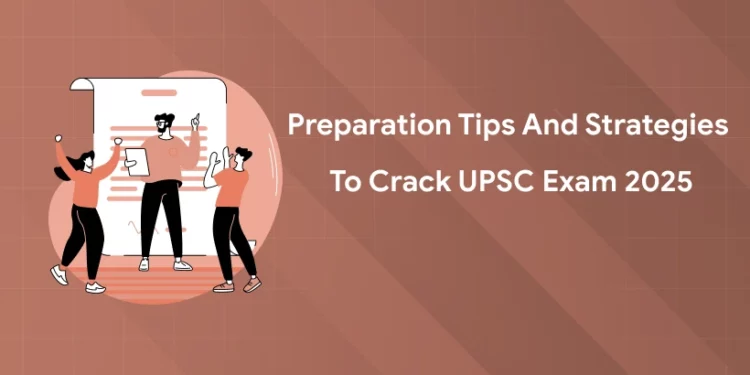Table of Contents
UPSC Civil Services examination is considered to be the most prestigious and toughest of all competitive examinations. Only the determined candidates can pass through the exam procedure towards the dream job. Obviously, the syllabus for the examination and exam pattern will be a hard nut, to strain out the best of best candidates from lakhs of applicants. So, the UPSC exam preparation should be well-planned to crack the examination. Let us discuss the nuts and bolts on how to prepare for UPSC Exam 2025.
Get the CSAT Reasoning Mock Tests 2025
Union Public Service Commission is to hold the Civil Services Examination preliminary exam on 25th May 2025. It has given more than 100 days extra for aspirants to prepare for the exam. The recruitment of officers is done to various posts like Indian Administrative Service (IAS), Indian Foreign Service (IFS), Indian Police Service (IPS), Indian Revenue Service (IRS), Indian Defence Accounts Service, Indian Railway Traffic Service, Indian Information Service, etc.
How to Prepare for UPSC Exam 2025?
The common question arising for the aspirants regarding the UPSC preparation is ‘Am I able to prepare and can I handle the preparation for this toughest exam’? ‘Is UPSC CSE exam really hard nut to crack? ‘Can I follow a study plan’? ‘Will I be able to complete the whole syllabus’?
As I suggest, the primary step is to understand the examination, before getting prepared! As told earlier this is a tough examination. Realizing this fact only move to the next step – prepare yourself for the examination. This exam needs immense hard work and patience. You may not be able to pass the examination in one go.
Latest updates from UPSC regarding the CSAT 2025 – Subscribe here
UPSC Exam Preparation Tips in Brief
1: Which one of the following is not a Harappan site?
- Be self-motivated
- Develop a hobby of your own to indulge in break times
- Be a patient reader of NCERT texts
- Make a habit of Newspaper reading
- Start practicing to write
- Practicing the previous year question papers
- Online mock test series
UPSC Preparation Strategy and Tips
Here are some UPSC preparation strategies and tips mentioned. Aspirants can go through, and well, it is suggested to take the idea and follow the convenient ones to reach your goal!
Know the Exam, Dates and Time
Know the exam you are about to attempt. Decide wholeheartedly to will crack. Once this is done undoubtedly, then halfway is done! Now, move on with examination preparations. Aspirants should be alert of the exam dates, postponement dates, etc. Arrange the preparation accordingly.
The date, time of the examination should be there in mind. Arrange to reach examination hall on time. The last-minute hurry to reach will really affect your examination.
Prepare yourselves to Attempt the UPSC
Self Confidence, Serious, Disciplined
Aspirants must be self-confident – but not overconfident! Be self-motivated towards the process of learning. This will make your preparation time relaxed and fast. The approach of aspirants should be serious, never think like it is an easy go. Put your cent percent hard work. And the preparation planned should be covered in the discipline.
Rise and Shine
Rise early. It is always suggested to be an early riser. The morning time is the best time to start studies freshly. And will keep yourself fresh throughout the day. Positivity matters! Aspirants can practice Yoga or warm-ups and meditation which will help to reduce stress.
Stay Sane
Maintain health is the sole responsibility of candidates. Don’t stress much. The exam needs both physical fitness and mental fitness. The CSAT and Mains and Interview phases require the presence of mind and concentration.
Understanding the UPSC Exam Patterns and Syllabus
As we all know there are three phases for the selection- Prelims, Mains, and Personal Interview.
Preliminary Exam Pattern
| Paper | Number of questions | Maximum Marks | Exam Duration |
| General Studies I | 100 | 200 | 2 hours |
| General Studies II (CSAT) | 80 | 200 | 2 hours |
Mains Exam Pattern
| Paper | Subject | Exam Duration | Total marks |
| Paper A | Compulsory Indian language (Languages included in the Eighth Schedule to the Constitution) | 3 hours | 300 |
| Paper B | English Language | 3 hours | 300 |
| Paper I | Essay | 3 hours | 250 |
| Paper-II | General Studies- I (Indian Heritage and Culture, History, and Geography of the World and Society) | 3 hours | 250 |
| Paper III | General Studies- II (Governance, Constitution, Polity, Social Justice and International relations) | 3 hours | 250 |
| Paper IV | General Studies- III (Technology, Economic Development, Bio-diversity, Environment, Security and Disaster Management) | 3 hours | 250 |
| Paper V | General Studies IV (Ethics, Integrity, and Aptitude) | 3 hours | 250 |
| Paper VI | Optional I | 3 hours | 250 |
| Paper VII | Optional II | 3 hours | 250 |
Personal Interview
For the last round, Interview, the maximum mark allotted is 275. And then, the total marks for the merit will be out of 2075.
Stage-wise UPSC Preparation Tips
Prelims Exam
The General Studies paper and CSAT online exam require accuracy and speed. CSAT is of qualifying nature. Cover each topic with equal importance. there is no such special weightage mentioned for the subjects.
- UPSC GK Questions and Answers
- Prepare for Reasoning in UPSC Exam
- Quantitative Aptitude Preparation Strategy
Mains Exam Preparation
Mains descriptive test requires writing skills. So, practice the writings, daily from the prelims preparation period itself. The speed, subject knowledge everything matters. In-depth knowledge of topics, current happenings are required.
Be ready for the test of Personality
Be sincere and honest with your answers. The knowledge of the candidate has been already tested with prelims and Mains, now the personality is gonna tested!! So, don’t make Yes, for your No’s. Usually, the personal introduction, hobbies, situation handling tactics, etc are asked. So, sometimes hobbies developed for stress relief can add points to your interviews!
Optional Paper Preparation
List of available optional papers for Mains Paper VI and VII
| Agriculture | Animal Husbandry and Veterinary Science | Anthropology | Botany | Chemistry |
| Civil Engineering | Commerce and Accountancy | Economics | Electrical Engineering | Geography |
| Geology | History | Law | Management | Mathematics |
| Mechanical Engineering | Medical Science | Philosophy | Physics | Political Science and International Relations |
| Psychology | Public Administration | Sociology | Statistics | Zoology |
Literature of any following Languages
Assamese, Bengali, Bodo, Dogri, Gujarati, Hindi, Kannada, Kashmiri, Konkani, Maithili, Malayalam, Manipuri, Marathi, Nepali, Odia, Punjabi, Sanskrit, Santhali, Sindhi, Tamil, Telugu, Urdu, and English.
Focus on Study Plans
Aspirants should always concentrate on the preparation plan designed or opted by them. The tailored plans for long-term and crash courses are available on Entri.
Make a Habit of following Plan
Always concentrate on the plan you have opted for. Never distract yourselves. Keep daily, weekly, and monthly target portions to be achieved. And, reaffirm the topics are completed. But it is important not to rush for mere satisfaction, and not to be stuck over the topics!
Syllabus
Remember the quote of Abraham Lincoln – Give me six hours to chop down a tree and I will spend the first four sharpening the axe!!
The UPSC syllabus is the main focus of the examination. The vast syllabus to be covered for the prelims, mains make the exam more challenging. The time period available will not be proportional to that be studied. The static GK and current affairs updations along with practicing mocks and attempting previous question papers are really backbreaking. So, for sure without proper planning candidates will not be able to crack the exam’
Get an Idea of Cut Off Marks
Candidates should focus on previous cut scores, so that, they can fix an expected cut-off while attempting mock or previous papers. Compare scores to previous and expected cut off. If your marks always excel, will really boost your preparation. And can focus more on the next level of preparation!!
Prelims Cut-off marks will be on the basis of GS Paper-I only. GS Paper-II was of qualifying nature with 33% marks as per Rule-15 of Civil Services Examination, 2025. And, that of the Mains Cut off marks subject to 10% marks in each of the seven competitive papers i.e. Essay, GS-I, GS-II, GS-III, GS-IV, Optional-I, and Optional-II.
Be Aware of the Number of possible Attempts
Many candidates lose their chances, without being aware of the restricted number of attempts for the UPSC CSE. Those candidates who exceed the maximum, will not be further able to attend the exam. That is the chance once missed will not be added again. So, proper preparation is very much essential. Check the possible number of attempts for each category:
- General category – 6 attempts
- OBC category – 9 attempts
- SC/ST candidates – Not restricted
Source for preparations should be Limited
Don’t go for all the books available in the market. Be selective in the case of study materials. The list of must references are:
Current Affairs
- A newspaper such as The Hindu or Indian Express – Read thoroughly to improve language skills, note important news. Don’t skip the Editorial section (a good source for the Polity and Essay papers in Main’s exams).
- Yojana Magazine or Kurukshetra.
- Yearbook and Economic Survey
Subjects Reference List
Class 6-12th NCERT books (for all subjects), Spectrum – A brief history of Modern India, Bipin Chandra’s Struggle for Independence, Oxford Atlas, G.C. Leong – Physical Geography, Laxmikant – Indian Polity, Indian Economy by Ramesh Singh, The Indian Economy by Sanjiv Verma, Economy Survey Summary, Science Reporter Magazine.
Mock Tests, Previous Papers, and Revisions
Candidates should practice mock tests regularly to follow the points or topics learned. Previous papers are to be practiced from starting period to have an idea of topics repeatedly asked, patterns, and areas to be focused on and in which more concentrated.
It is important to have proper revisions. While attempting any competitive exam, it is a mantra that, be confident with portions you have covered. Try to devote the last 2 months before the exam only for revisions.
Don’t give UP
Perseverance is required as you are going through an effortful process. Sometimes the result may be delayed. But be calm, and do your part. Remember the cure for bad times is patience!
Check the Don’ts while preparing
- Avoid a large number of books! Narrow your reference to the required and apt selection of study materials
- Listening to success stories – To an extend this helps to boost confidence. But following their track will not reach you to success. Keep your own path according to your skills and ability.
- Cut wastage of time on the Internet and social media
- Avoid the last moment preparation. Also, don’t choose a new topic during the revision time.
To summarize, gear up your preparations from the UPSC preparation strategies and tips, aspirants can make their own study plans that suit their grasping power and memory. Hope the article on UPSC exam preparation tips and strategies to be followed, helped you to have an idea of UPSC preparation strategies. As now the prelims are expected around October, it is high time aspirants start revisions. Never go for new topics, but revise and keep in hand that you have prepared in the past months. So, make use of the additional time. Remember the quotes of Benjamin Franklin – By failing to prepare, you are preparing to fail.
Download the App and Practice GK and Indian Polity mock tests!











